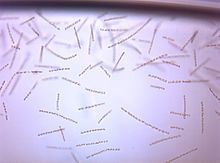Chaetoceros furcellatus
 From Wikipedia the free encyclopedia
From Wikipedia the free encyclopedia
| Chaetoceros furcellatus | |
|---|---|
 | |
| Scientific classification | |
| Domain: | Eukaryota |
| Clade: | Diaphoretickes |
| Clade: | SAR |
| Clade: | Stramenopiles |
| Phylum: | Gyrista |
| Subphylum: | Ochrophytina |
| Class: | Bacillariophyceae |
| Order: | incertae sedis |
| Family: | Chaetocerotaceae |
| Genus: | Chaetoceros |
| Species: | C. furcellatus |
| Binomial name | |
| Chaetoceros furcellatus (Bailey, 1856) | |
Chaetoceros furcellatus is an Arctic neritic diatom in the genus Chaetoceros. The easiest way to identify this species is by finding the very characteristic resting spores. C. furcellatus is a common and important species in the Barents Sea.[1]
Species description
[edit]Cells united into chains that can be long and slightly curved. Valve face is flat to slightly concave with a central inflation. The setae originate inside the valve margin. Resting spores occur in pairs fused by a basal plate, one setae sticks out on each side of the pair, perpendicular to the chain axis, and splits in two, half a cell length from the valve margin[2]
References
[edit]- ^ C.H. von Quillfeldt., (2001). Identification of Some Easily Confused Common Diatom Species in Arctic Spring Blooms. Botanica Marina Vol. 44: 375 - 389
- ^ Tomas, C. R., Hasle G. R., Syvertsen, E. E., Steidinger, K. A., Tangen, K., Throndsen, J., Heimdal, B. R., (1997). Identifying Marine Phytoplankton, Academic Press.
External links
[edit]